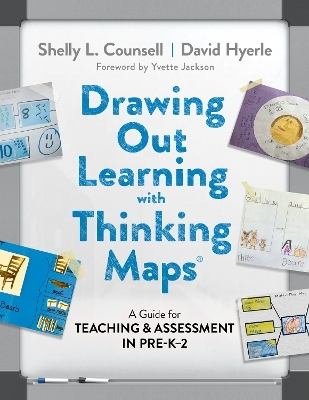
Drawing Out Learning With Thinking Maps®
Teachers' College Press (Verlag)
978-0-8077-6777-1 (ISBN)
- Titel z.Zt. nicht lieferbar
- Versandkostenfrei
- Auch auf Rechnung
- Artikel merken
What and how young children are thinking are typically expressed and shared at home and school through verbal and written modes of communication. As a visual language framework conceived and developed by David Hyerle, Thinking Maps® offers an additional way for learners to represent their ideas by visually mapping their fundamental patterns of thinking. The authors offer a wide range of materials, strategies, and evidence-based practices for implementing Thinking Maps (and the metacognitive framing strategy that each map promotes) in ways that are developmentally appropriate, culturally responsive, and more inclusive with the full range of pre-K to 2nd-grade children. Since 1990, Thinking Maps have been implemented by teachers in over 15,000 schools across the United States and around the world, including countrywide implementation in Malaysia. This guide provides a whole-child approach with practical ideas and best applications for working with emergent readers and writers across developmental domains, curricula, and executive function.
Book Features:
Promotes systematic support of every students’ cognitive development in whole schools (pre-K–2).
Demonstrates how to use visual, auditory, tactile, and kinesthetic activities and materials to increase student engagement.
Recommends Universally Designed Learning strategies to ensure full access and inclusion with diverse learners and children with disabilities.
Includes graphically designed examples of Thinking Maps across content areas.
Provides examples of student work, lesson planning ideas, and curriculum design based on cognitive education.
Links language and thinking in everyday classroom learning for individual and cooperative learning.
Shelly L. Counsell is a retired associate professor of early childhood education, an early childhood consultant, and an Early Years Columnist with NSTA’s Science & Children. David Hyerle is a bestselling author, developer of the Thinking Maps® model, and president of Thinking Schools International.
Contents
List of Figures vii
List of Tables xi
Foreword Yvette Jackson xiii
Acknowledgments xv
Introduction: Can I Use Thinking Maps With Young Children? Yes, You Can! 1
Thinking Maps: Integrating Three Types of Visual Tools 2
Why Early Childhood? 3
Thinking Maps as a Learning, Teaching, and Assessment Framework 4
1. Bringing Thinking Maps to Life 9
Learning Trajectories and Developmental Progressions 9
The Five Critical Attributes of Thinking Maps 12
TMaps Tap Into Prior Knowledge and Experience 14
Thinking Maps Exemplifies Universally Designed Learning (UDL) 15
Conclusion 21
2. Thinking Maps Across Developmental Domains 22
Developmentally Appropriate Practice 22
Domain 1—Cognitive Development 24
Domain 2—Socioemotional Development 28
Domain 3—Physical and Healthy 29
Domain 4—General Learning Competencies 29
Conclusion 30
3. Thinking Maps Across Academic Content Areas 31
Thinking Maps Inspire Talking, Reading, and Writing 32
Thinking Maps Support Logical-Mathematical Reasoning 42
Thinking Maps Promote Scientific Thinking, Reasoning, and Inquiry 44
Engineering Design and Technology With Thinking Maps 54
Social Studies Instruction and Thinking Maps 55
Related Early Childhood Approaches and Curricula 57
Conclusion 59
4. Thinking Maps Promote Democratic Learning Communities With Full Community Membership 60
Thinking Maps Promote Responsive, Democratic Learning 60
Conclusion 71
5. Thinking Maps Provide Authentic Formative Assessment and Documentation 72
A Brief Historical Perspective of Standardized Testing 72
Classroom Assessments 74
Conclusion 80
6. The Science Underlying Thinking Maps With Young Children 81
Research and Theoretical Foundation for Thinking Maps 81
Executive Function 81
Self-Regulation 84
Habits of Mind 85
Alignment With Standards 87
Conclusion 89
Appendix: Glossary 91
References 93
Index 105
About the Authors 111
| Erscheinungsdatum | 11.07.2023 |
|---|---|
| Vorwort | Yvette Jackson |
| Verlagsort | New York |
| Sprache | englisch |
| Maße | 222 x 286 mm |
| Gewicht | 254 g |
| Themenwelt | Sozialwissenschaften ► Pädagogik ► Vorschulpädagogik |
| ISBN-10 | 0-8077-6777-8 / 0807767778 |
| ISBN-13 | 978-0-8077-6777-1 / 9780807767771 |
| Zustand | Neuware |
| Informationen gemäß Produktsicherheitsverordnung (GPSR) | |
| Haben Sie eine Frage zum Produkt? |
aus dem Bereich


